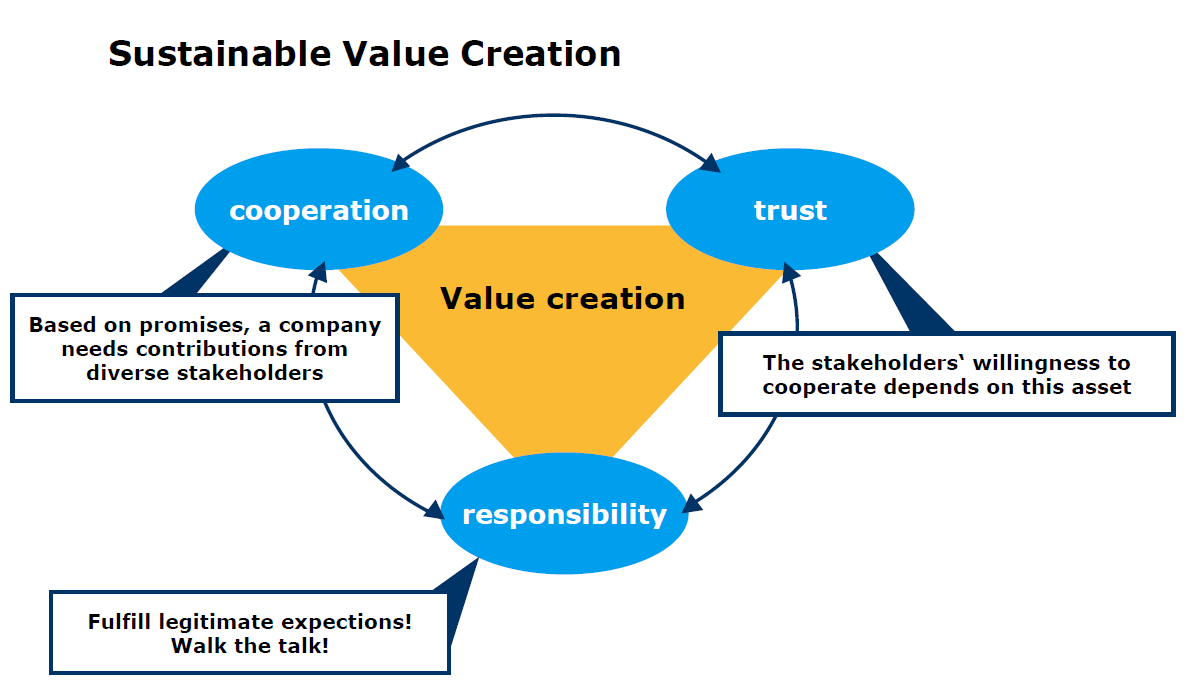Overview
Supporter
Dr. Werner Jackstädt Foundation
Team
- Prof. Dr. Andreas Suchanek (Chairholder)
- Beate Kanheißner (Team Assistant)
- Maja Petrushevska (Research Associate)
- Christin Philipp (Research Associate)
Research Areas
- Economic and business ethics
- Theory of corporate responsibility
- Management of trust
Network
- Dr. Werner Jackstädt Foundation
- Stifterverband (Donors’ Association for the Promotion of Sciences and Humanities in Germany)
- Wittenberg Center for Global Ethics
- Association for Social Policy, Committee of Economics and Ethics
Courses
- Business Ethics
- Corporate Social Responsibility in a Globalized World
- Global Governance and Corporate Social Responsibility
- Philosophical Underpinnings of Management Research

Invest in trust!
What we do
The Dr. Werner Jackstädt Chair of Economic and Business Ethics is dedicated to the dialog between theory and practice on the topic of corporate responsibility: On the basis of a theoretical conception which recognizes the moral quality of the market economy, we are oriented towards the practical problems and, thus, the question of how profit and morals can fruitfully coexist. Here, we apply the golden rule: Invest in the conditions of social cooperation for mutual advantage!
Therefore, good management means to be economically successful by implementing values-based management practices. Under the conditions of competition, this maxim constitutes a challenging task for the management of corporations.
The chair aims to enhance students’ ability to make reasonable ethical judgments by emphasizing the importance of focusing on a clearly defined problem, working as a team player and having a personal sense of responsibility.
Prof. Dr. Andreas Suchanek
In business management, (ethical) discernment of decision makers plays a vital, but often underestimated role for the long term success of value creation. It is one of the central challenges of “good management” to constantly align success and responsibility in business. The well-known conflict between market and moral or profit and ethics and possible approaches are the main focus of my research and teaching at HHL. The idea is to transform the conflict into a chance of creating value: The costs of responsible behavior are an investment in trust, which pays often well over time.
After studying Economics at the German universities of Kiel and Göttingen, I worked as acting chair for Business and Economic Ethics at Ingolstadt School of Management (Catholic University of Eichstätt-Ingolstadt). In 2004 I joined HHL and was Dow Research Professor of Sustainability and Global Ethics. Since 2009, I have been the chairholder of the Dr. Werner Jackstädt Chair of Economic and Business Ethics. As an ethics professor at HHL, my aim is to teach students the complexity of business life and possible grey areas. They shall learn why and how to invest in trust in a fast-moving and complex business world.
Apart from my work at HHL I am chairman of the board of the Wittenberg Center for Global Ethics which is an independent, international and interdenominational initiative of persons and organizations from politics, business, academia, the Churches and civil society. It aims at identifying general ethical principles for effective and responsible leadership.
I am reviewer for the German Research Society (DFG) and diverse foundations as well as various scientific journals such as the Journal of Business Ethics (JBE), the Journal for Business, Economics, and Ethics (zfwu), ORDO and others. Furthermore I am an active member of diverse advisory committees such as for the CSR Forum of the German Federal Government, the Chemistry Foundation Academy of Social Partners (CSSA), the scientific council of the Federal Association of Compliance Managers and others.
If you are interested in an interview or a press photo, please contact Elisa Vetter (Media Relations Manager).
Sustainable Value Creation
The Dr. Werner Jackstädt Chair of Economic and Business Ethics believes that corporations must pursue sustainable value creation in order to maintain their societal legitimacy. The following diagram exemplifies the key pillars of sustainable value creation:

Projects
Nudging Corporate Compliance and Integrity – Based on the Ethical Compass
Project supported by KBA-Notasys Integrity fund
From society’s viewpoint, corporate compliance is a necessary prerequisite for a corporation’s license to operate. For corporations, and more specifically, for their members in concrete situations, compliance is often perceived as a cost, be it direct or, more importantly, indirect, namely as a constraint not to choose an alternative that may be seen as advantageous, but not in line with compliance or integrity demands.
The project “Nudging Corporate Compliance and Integrity – Based on the Ethical Compass” is intended to elaborate on two combined tools for more effective compliance and integrity (C&I) management: an ethical compass and nudging. The mentioned tools aim at motivating compliance and integrity demands as an investment in sustainable value creation (Ethical Compass) and supporting this motivation with concrete behavioral interventions (Nudging). Accordingly, two implementation problems can be identified: (1) to understand the “Why”, that is, the deeper reason for compliance and integrity which, if perceived, might increase the willingness to adhere to the rules and standards of proper conduct; (2) to actually be compliant in situations where opposing situational incentives might tempt or push persons to be non-compliant.
The goal of the project is to explore the possibilities to support C&I management with the Ethical Compass and Nudging and to specify (a) the conditions, (b) the constraints and (c) the concrete measures. A crucial feature of the project is the integration of conceptual (ethical, economic and psychological) knowledge with experiences from practice in order to ensure the relevance and usability of the developed tools. Based on desk research, questionnaires and interviews as well as an expert workshop, the objective is to provide a handbook for corporations on how to implement both tools for effective compliance and integrity management. The insights documented in the handbook should provide a framework for future research as well as an orientation for practitioners in the field of compliance and integrity management.
Publications
Click on the button to load the content from HHL publications database.
